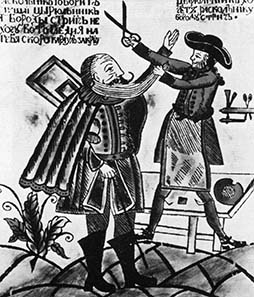On September 5th, 1698, Peter – who was later to be called The Great – returned from his educational tour in the metropolises of Europe to Moscow. Of course, all important officials, the flunkeys and all those hoping for the Tsar to confer a favour on them gathered at the court the next morning. But instead of talking to them about Russia’s political future, Peter did something totally unexpected. He pulled a long and sharp razor from his bag and began to shave the commander in chief of the army. The latter was too stunned to react. The next in line followed, an important politician, a boyar stemming from the eldest and noblest Russian family. One Russian nobleman after the other was shaved except for three people. Peter spared only the Patriarch, a very old man and his own guardian.
An official of Peter the Great shaves the beard of a boyar.
All the other big wigs in politics had to live with the fact that they had committed a big sin according to the Orthodox Church. Ivan the Terrible had worded: “Shaving the beard is a sin the blood of all martyrs will not wash away. It would mean blemishing the image of man as God had created him.” Patriarch Adrian had verbalized only recently: “God created man beardless, only dogs and cats have beards. Shaving is not just a stupid thing to do, it is a capital sin.” Hence, all people living in close contact with the Tsar were forced to renounce their faith in favour of the so-called progress.
At first, the shaving skills of the Tsar were restricted to those living closest to him. But shortly afterwards, Peter gave the order for the ordinary people to follow the example of the big wigs. The Tsar imposed a prohibition for every inhabitant of his country to wear a beard. Exceptions were made only for churchmen and peasants. Officials were sent out to supervise the ukase’s implementation and to personally shave anybody refusing to obey on the spot.
But Russia would not be Russia if the officials had not been willing to miss a beard for a small reward. Buying the illegal tolerance, however, could cost bearded men dearly. After all, each and every official encountering a bearded man was entitled to shave.
Russian token proving that the beard tax had been paid. 1705. From auction Baldwin 26 (2001), 2110.
Peter saw that abuse and his subjects’ willingness to buy the beards with money. The westernization of the Russian nobility being accomplished, he could be generous with the commoners. Peter enacted a new law that enforced the peasants to shave, too, but allowed all Russians who did not want to part with their beards to acquire the right to keep them for a tax.
It was a progressive tax: the humble peasant paid two kopeks, a rich merchant up to 100 rubles. In return, they were given a copper token with the image of a beard and the Russian words “tax paid”.
Those tokens have come down to us in several examples (fig. 2) and remind us of a time when a governing politician was still under the impression that he could control the progress of his country with the garment of his citizens.





